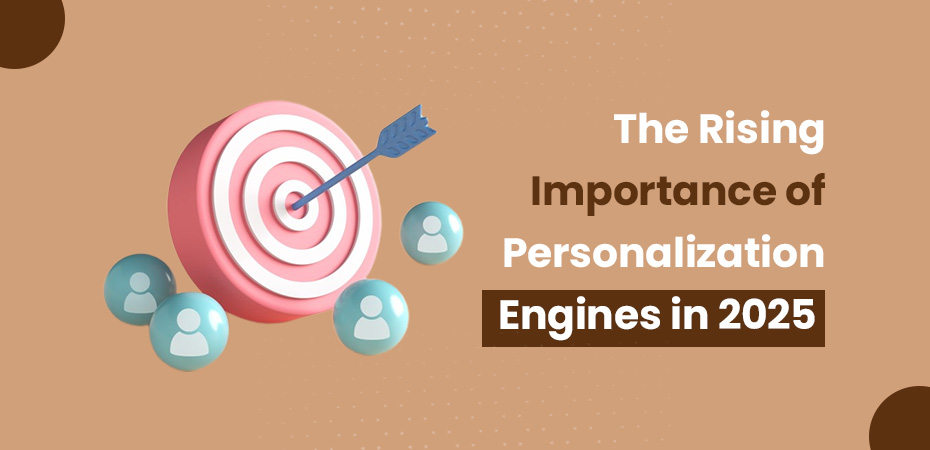The Rising Importance of Personalization Engines in 2025



Personalization engines are evolving as central elements of digital strategy, carefully shaping user experiences to maximize engagement, retention, and conversion. Their advancement in the modern digital landscape cannot be overstated. Predictions indicate that by 2025, these systems will be indispensable tools in digital strategy.
They will shape user experiences intuitively, thereby influencing customer behaviors through enhanced engagement, driving consumer retention, and improving conversion rates. This future advancement underscores the urgent need to emphasize their growing importance.
Consequently, organizations must focus on understanding and implementing these advanced personalization engines sooner rather than later, to effectively compete and thrive in the digital space.
A Comprehensive Understanding of Personalization Engines
Personalization engines are sophisticated systems that help businesses serve their customers better by providing unique experiences. They employ special algorithms that use advanced technology like Artificial Intelligence (AI) and Machine Learning (ML) to perform tasks. These tasks involve collecting and analyzing data related to customers’ behaviors and preferences, and then applying this information to create personalized experiences.
- AI Personalization: The AI in the personalization engines aids in understanding users’ preferences and delivering content that matches their tastes. It analyses the user’s past interactions and activities to predict what they may like in the future. By doing so, it ensures that the user finds value in their interactions with the business.
- Personalization software: This is the core tool of personalization engines. This software uses AI and ML to make sense of the data it collects. It draws from the user’s digital footprints to help create an accurate picture of their preferences, tastes, and interests. The personalisation software then uses this information to tailor the user’s experience with the business, increasing satisfaction and loyalty.
- AI for Content Personalization: Personalization engines also use AI for content personalization. This aspect of AI studies the type of content that a user interacts with and enjoys. It then uses this information to recommend similar content, making each user’s experience feel unique and customized.
These aspects of personalization engines make them vital tools for businesses. They not only help businesses retain existing customers but also attract new ones by providing an individualized experience. The exponential growth of personalization engines is indeed a testament to their efficiency and the transformative power of AI and Machine Learning.
Why Are Personalization Engines Important in 2025?
In 2025, businesses need to provide highly relevant and engaging experiences to keep customers interested. This is where personalization engines play a key role. They use advanced technology to analyze user behavior, preferences, and interactions to deliver customized content, recommendations, and offers. Here’s why they are more important than ever:
Customer Expectations Are Higher
- People want brands to understand their needs and provide tailored experiences.
- A personalization platform ensures that customers see products, services, or content that matter to them.
Increased Competition in Digital Markets
- Businesses that do not adopt data personalization will struggle to stand out.
- A personalization engine helps brands create unique, customer-centric experiences.
AI and Automation Make Personalization Smarter
- Advanced AI-driven personalization platforms process data in real time.
- This means businesses can react quickly to customer needs and trends.
Better Engagement and Sales
- When customers see relevant content, they stay longer and engage more.
- Data personalization ensures that every interaction feels meaningful.
Privacy-Friendly Personalization
- With new privacy laws, brands need to balance customization with data security.
- A personalization engine helps businesses offer tailored experiences while respecting privacy rules.
By 2025, companies that use personalization platforms effectively will create stronger customer relationships and stay ahead of the competition.
The Role of AI and Machine Learning in Personalization Engines
Artificial Intelligence (AI) and Machine Learning (ML) play a central role in personalization engines to make online experiences individualized for each user. These digital engines, powered by AI and ML, have the ability to collect extensive data in real-time, analyze it, and make predictions about user behavior.
Let’s break it down a bit:
- Collected Data: Firstly, the AI and personalization system works tirelessly to gather important data about the user. This might include browsing habits, buying behavior, search preferences, and much more. This extensive data collection happens in real-time allowing for immediate personalization.
- Data Analysis: Next, this collected data goes through a meticulous analysis by the AI content personalization system. It tries to understand user behavior patterns and trends. This analysis is crucial for creating truly personalized experiences.
- Predictive Modelling: Based on the continuous real-time analysis, AI and ML can predict user preferences. They can anticipate the users’ future needs and behaviors. This predictive modeling is invaluable in focusing targeted recommendations and offers.
In essence, an ecommerce personalization platform that leverages AI and ML can provide a personalisation platform that is both dynamic and highly engaging. The immediacy and accuracy of AI based personalization helps ecommerce platforms create a unique online experience for each individual user.
And it doesn’t stop there. The fantastic thing about AI and ML is that they continuously learn and adapt. Over time, thanks to machine learning, the content personalization AI gets better at predicting and responding to user behavior, making the personalization process even more accurate and relevant.
AI and ML are driving personalization engines of the future. They are enhancing user experience by tailoring experiences perfectly suited to individual preferences, all in real-time. This seamless personalization is the key to customer engagement and ecommerce success in the digital age.
Application of Personalization Engines: Moving Beyond Retail
Initially, organizations were using personalization engines primarily in the retail sector, providing customized customer experiences and marketing messages. Especially, digital personalization platform played an instrumental role. But now, other industries like healthcare, finance and education are gradually realizing the potential of these engines and their importance in the present digital world.
- Healthcare: Automation and personalization are revolutionizing the healthcare sector. Personalization engines can be used to sift through medical histories, analyze patterns and generate insights. This is beneficial in providing individualized health care solutions and automated personalization improves patient engagement, tailoring communication to meet unique patient needs.
- Finance: In terms of finance, personalization engines are proving to be game-changers. Finance institutions leverage these customized engine solutions to offer personalized investment solutions. This enhances their customer orientation by providing services in sync with the customer’s risk appetite and financial goals.
- Education: The educational sector is an emerging field for the application of personalization engines. With the shift to online learning, these engines play an essential part in creating personalized learning paths. It tracks the user’s progress, identifies the weak areas and creates a unique path for individual learners.
So, the use and relevance of personalization engines have grown beyond retail. With automation, personalization, and digital personalization platform, other fields are now boldly harnessing its power.
The Expected Development of Personalization Engines by 2025
Personalization engines, which have long been an integral part of online experiences, are in a state of constant adaptation and evolution. As technology continues to improve, user behavior shifts, and business needs change, so do these complex tools. It is projected that by 2025, personalization engines will have significantly developed, becoming smarter, faster and more sophisticated than ever before.
Expect to see the following changes happening with personalization engines:
- Increased Efficiency: Aided by advancements in technology, these engines will not only become much faster, but they will also be more efficient. The speed and accuracy with which they process data will be greatly improved, facilitating more efficient operations.
- Better Understanding of User Behavior: As the engines continue to evolve, they will get better at understanding and interpreting user behavior. More sophisticated algorithms and models will allow them to accurately predict future actions of users, and curate personalized experiences accordingly.
- Hyper-Personalized Experiences: The future of personalization is hyper-personalization. By 2025, personalization engines will be equipped to create hyper-personalized experiences for users. These will be uniquely tailor-made for each individual user, based on their past behavior, preferences and needs. This type of personalization will serve to engage users more effectively and deeply.
- Adaptive to Business Needs: Lastly, personalization engines will be designed to be more adaptable to the changing needs of businesses. They will provide businesses with the flexibility to adjust the level of customization they desire for their user experiences.
With these futuristic advancements, personalization engines will become even more central to the digital experience, playing a bigger role in our interactions with online platforms.
Challenges in the Implementation of Personalization Engines
Despite the evident advantages, the implementation of personalization engines confronts multiple challenges, and one of the most significant among them is data privacy issues. With the surge in cyber-related incidents, consumers are becoming progressively more conscious about the safety of their personal data.
-Companies often have access to sensitive information about consumers from their previous interactions. However, utilizing this data for personalization needs careful navigation between delivering tailored services and not intruding into the user’s private space.
In some cases, the information collected might not precisely portray a user’s preferences due to varied reasons like shared devices or one-time searches. Adopting latest technologies and analytical techniques to analyze user data also requires substantial financial investment.
Making sense of vast repositories of data is also a challenge in itself. Accurately capturing user behavior patterns from this information is crucial for effective personalization.
Thus, it is imperative for companies to maintain a balance between personalization and privacy, ensuring that they remain within the confines of ethical boundaries and legal regulations.
Rising Importance of Personalization Engines in the SEO Sphere
Search Engine Optimization (SEO) has now evolved beyond just keyword targeting and high-ranking. It now revolves around enhancing the user experience, thus changing the game considerably. Personalization engines play a critical role in this area.
– Personalization engines help to offer unique user experiences based on their preferences and behavior. It creates a consistent and comforting user journey, inspiring trust and loyalty.
– By providing users with exactly what they’re looking for, bounce rates are reduced, and time spent on sites is increased. This significantly improves SEO ranking.
– Furthermore, personalization engines help in optimizing websites by displaying relevant suggestions or results to users. – Efficient personalization may also lead to viral sharing, boosting organic traffic, and exponentially improving SEO.
Therefore, integrating a personalization engine into your SEO strategy could be your key to driving increased user interaction, engagement, and ultimately, better outcomes in the complex digital landscape.
Conclusion
In conclusion, the digital marketing landscape is fast-evolving with personalization engines at the forefront. These technologies not only provide businesses an edge but also elevate the customer experience by serving bespoke content.
By 2025, this trend will only rise in importance as businesses seek to differentiate and tailor their services. Optimize your online presence for maximum engagement and efficiency with the help of a Core Web Vitals Consultant today. Exploit the benefits of these advanced technologies and stay ahead of your competitors. Make the right move, invest in a Core Web Vitals Consultant now!
Frequently Asked Questions (FAQs)
A personalization engine uses AI and ML-driven algorithms to collect and analyze user data. It then applies this data to create personalized experiences, thereby enhancing user engagement and satisfaction.
AI and ML form the backbone of personalization engines by making real-time data collection and analysis of user behavior possible. Their predictive capabilities facilitate the creation of personalized experiences for every user.
Although initially used primarily in retail, personalization engines’ application now extends to sectors like finance, healthcare, and education. They have become universally relevant due to their ability to enhance user experiences.
Despite their numerous advantages, personalization engines also come with challenges. Data privacy issues are primary concerns, as companies must strike a balance between offering personalized experiences and maintaining user data privacy.
Personalization engines aid in SEO by improving the user experience, which is essential for favorable search engine rankings. They help provide a seamless and personalized user journey, thus boosting SEO performance.